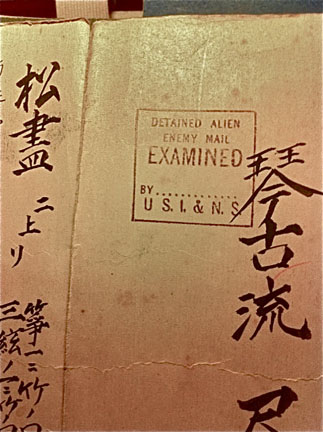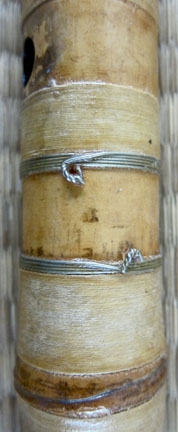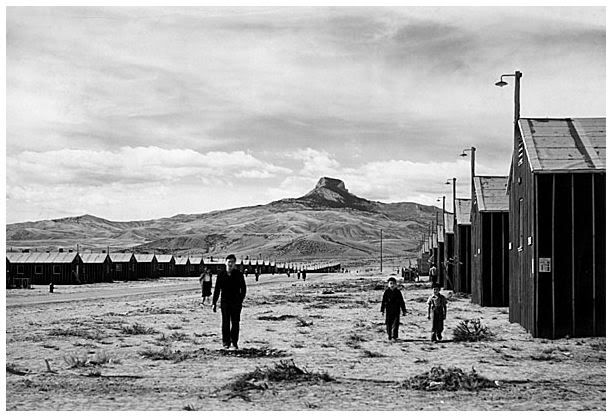Mujitsu and Tairaku's Shakuhachi BBQ
World Shakuhachi Discussion / Go to Live Shakuhachi Chat
You are not logged in.
Tube of delight!
#1 2011-02-26 02:13:40
- Moran from Planet X
- Member

- From: Here to There
- Registered: 2005-10-11
- Posts: 1524
- Website
Restoration of 1.8' Shakuhachi Rescued from a WWII-era camp
Restoration of 1.8' Shakuhachi Rescued from a WWII-era Japanese Internment Camp
From Monty's site if you haven't seen this. The story is remarkable:
http://www.shakuhachi.com/Q-Restoration-Gallery-15.html
"I have come here to chew bubblegum and kick ass...and I am all out of bubblegum." —Rowdy Piper, They Live!
Offline
#2 2011-02-26 06:26:32
- Kouu
- Member

- Registered: 2009-07-21
- Posts: 25
Re: Restoration of 1.8' Shakuhachi Rescued from a WWII-era camp
Cool story.
That shakuhachi must have been a great comfort to it's owner.
The binding itself suggests barbed wire and incarceration.
Offline
#3 2011-02-26 10:14:06
- Toby
- Shakuhachi Scientist

- From: out somewhere circling the sun
- Registered: 2008-03-15
- Posts: 405
Re: Restoration of 1.8' Shakuhachi Rescued from a WWII-era camp
Great story. In several museums in Japan I have seen shakuhachi belonging to young kamikaze pilots, whose belongings were donated to those institutions after the war. Strange to think of them playing, and then flying off on suicide missions to kill others while killing themselves. Their letters make it clear that they were not exactly enthusiastic about dying...talk about being caught between a rock and a hard place...
Offline
#4 2011-02-26 10:51:21
- Yungflutes
- Flutemaker/Performer

- From: New York City
- Registered: 2005-10-08
- Posts: 1061
- Website
Re: Restoration of 1.8' Shakuhachi Rescued from a WWII-era camp
Moran from Planet X wrote:
Restoration of 1.8' Shakuhachi Rescued from a WWII-era Japanese Internment Camp
http://www.shakuhachi.com/Images/Q-Rest … uka-15.jpg
From Monty's site if you haven't seen this. The story is remarkable:
http://www.shakuhachi.com/Q-Restoration-Gallery-15.html
Great! I loved how Monty used "rebirth" at the end of his story. These flutes are truly alive. I often feel shivers when I hear the voice of a newly restored shakuhachi after years of being silent.
Kouu wrote:
That shakuhachi must have been a great comfort to it's owner.
The binding itself suggests barbed wire and incarceration.
The Japanese are known to be craftsmen/women at heart. I am presently working on a theater piece based on the crafts made by the Japanese while they were incarcerated. It's inspired by an exhibit at the Smithsonian. I'm working with Richard Ebihara, whose mother was born in one of the smaller relocation camp in Topaz, Utah. He has boxes that his grandfather built when he was interned. It's going to include shakuhachi with voice and accordion.
Toby wrote:
Great story. In several museums in Japan I have seen shakuhachi belonging to young kamikaze pilots, whose belongings were donated to those institutions after the war. Strange to think of them playing, and then flying off on suicide missions to kill others while killing themselves. Their letters make it clear that they were not exactly enthusiastic about dying...talk about being caught between a rock and a hard place...
Yes Toby. The Emperor was all powerful. Anyone interested in the mindset of the kamikaze should check out the Wings of Defeat documentary about the Kamikaze pilots.
http://www.youtube.com/watch?v=jwPuKup7NGw
The director, Risa Morimoto, interviews ex-kamikaze and American sailors who fought them. This film was so powerful that a second documentary was made as the interviewees wanted to meet after seeing the film. The Americans went to Japan and shared sake with their once most hated enemies. How incredible is that? You never know where the road will take you.
"A hot dog is not an animal." - Jet Yung
My Blog/Website on the art of shakuhachi...and parenting.
How to make an Urban Shakuhachi (PVC)
Offline
#5 2011-02-27 03:23:45
- Toby
- Shakuhachi Scientist

- From: out somewhere circling the sun
- Registered: 2008-03-15
- Posts: 405
Re: Restoration of 1.8' Shakuhachi Rescued from a WWII-era camp
Actually Perry, if you read Herbert Bix's book on Hirohito, you'll see that the Emperor himself was between a rock and a hard place, involved in trying to keep his throne out of this hands of his brother Chichibu, who was heavily in bed with the military and the nationalists. Add to that deliberate provocations on the part of the Americans, such as the oil embargo and other insults starting in the 1920's and it makes the situation of Japan less than black and white, as we "victors" like to picture it.
Offline
#6 2011-02-28 07:18:03
- Tono
- Member

- Registered: 2007-09-28
- Posts: 43
Re: Restoration of 1.8' Shakuhachi Rescued from a WWII-era camp
Toby, you really have turned Japanese :-)
Why read Bix when Buchanan suprisingly sums it up right here:
http://www.theamericancause.org/patwhydidjapan.htm
What insults did Bix add?
Heart Mountain
Cost of Reparartion $1,600,000,000/110,000 internees =$14,545.45 to each survivor or heir, as passed by Congress and signed by Reagan in 1988.
Germans and German Americans in the U.S. were detained and evicted from coastal areas on an individual basis totaling 11,507 internees.
Italians and Italian-Americans in the U.S. were detained and evicted on an individual basis totaling 2,930 internees.
Offline
#7 2011-02-28 08:44:36
- Yungflutes
- Flutemaker/Performer

- From: New York City
- Registered: 2005-10-08
- Posts: 1061
- Website
Re: Restoration of 1.8' Shakuhachi Rescued from a WWII-era camp
Toby wrote:
Actually Perry, if you read Herbert Bix's book on Hirohito, you'll see that the Emperor himself was between a rock and a hard place, involved in trying to keep his throne out of this hands of his brother Chichibu, who was heavily in bed with the military and the nationalists. Add to that deliberate provocations on the part of the Americans, such as the oil embargo and other insults starting in the 1920's and it makes the situation of Japan less than black and white, as we "victors" like to picture it.
Hi Toby, Of course, I should have been more clear. I meant all powerful in the symbolic sense, not political. That's why I didn't use Hirohto's name. To paraphrase one of the ex-kamikaze in the film, "The Emperor is like a god, we do not question his orders...no one practiced civil disobedience then..."
Tono wrote:
Cost of Reparartion $1,600,000,000/110,000 internees =$14,545.45 to each survivor or heir, as passed by Congress and signed by Reagan in 1988.
Yes, you can see how ridiculous this amount is when you think about the prime real estate many of these American citizens were forced to abandon and never retrieved - Downtown Los Angeles property and acres upon acres of farmland along the California coastline. At least the Japanese American Reparations Act was a step towards governmental accountability.
"A hot dog is not an animal." - Jet Yung
My Blog/Website on the art of shakuhachi...and parenting.
How to make an Urban Shakuhachi (PVC)
Offline
#8 2011-02-28 09:36:31
- Tono
- Member

- Registered: 2007-09-28
- Posts: 43
Re: Restoration of 1.8' Shakuhachi Rescued from a WWII-era camp
Yes, the apology felt good, and the money helped. At $13 a day for confinement, and no recompense for property loss, well, it's better than nothing though something less than equitable.
Offline